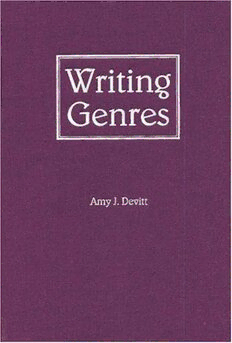
Writing Genres PDF
261 Pages·2004·5.042 MB·English
Most books are stored in the elastic cloud where traffic is expensive. For this reason, we have a limit on daily download.
Preview Writing Genres
Description:
In Writing Genres, Amy J. Devitt examines genre from social, linguistic, professional, and historical perspectives and explores genre’s educational uses, making this volume the most comprehensive view of genre theory today. Beginning by defining genre as a typified rhetorical action occurring at the nexus of situation, culture, and other genres, Devitt argues that genre highlights variations in texts necessary for creativity, a treatment that opposes the traditional view of genre as constraining and homogenizing. In step with contemporary genre scholarship, Writing Genres does not limit itself just to literary genres or to ideas of genres as formal conventions. Devitt succeeds in providing a theoretical definition of genre as rhetorical, dynamic, and flexible, as well as ideological and constraining. This theoretical approach sees genres as types of rhetorical actions that people perform and encounter everyday in academic, professional, and social interactions. As such, jokes, sweepstakes letters, junk mail, mystery novels, academic research papers, small talk, lectures, and travel brochures are all complex genres of their own. Genres such as these have the power to ease communication or to deceive, to enable someone to speak or to discourage someone from saying something different. Writing Genres demonstrates how genres function within their communities rhetorically and socially, how they develop out of their contexts historically, how genres relate to other types of norms and standards in language, and how genres nonetheless enable creativity. Devitt also advocates a critical genre pedagogy based on these ideas and provides a rationale for first-year writing classes grounded in teaching antecedent genres. This study’s research stems from the fields of rhetoric, composition, linguistics, communication studies, literary studies, and critical pedagogy, and works from rhetorical and social constructionist theory. Drawing from such theorists as Tzvetan Todorov, Mikhail Bakhtin, and M.A.K. Halliday, as well as the more recent efforts of Kathleen Hall Jamieson, David Russell, and Carolyn R. Miller, Devitt in turn blazes a trail for modern scholars by examining genres in their multiple contexts, exploring how genres develop, arguing that genres foster rather than restrict creativity, comparing literary and rhetorical genres, and advocating responsible teaching methods for future genre studies.
See more
The list of books you might like
Most books are stored in the elastic cloud where traffic is expensive. For this reason, we have a limit on daily download.
